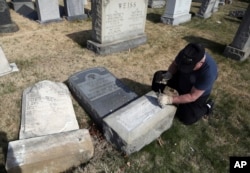Hate crimes, including attacks against American Jews and Muslims, spiked in several key U.S. cities in 2016, underscoring an upsurge that started during the presidential campaign and has continued unabated, according to data collected by researchers at California State University, San Bernardino.
Previously unpublished data by the university’s Center for the Study of Hate and Extremism show that hate crimes in at least six major urban centers, including New York City, Chicago and Columbus, Ohio, registered double-digit increases last year.
Among them:
- New York City notched an uptick of 24 percent in hate crimes, the highest in over a decade.
- New York state had an increase of 20 percent.
- Chicago saw a rise of 24 percent, the highest since at least 2010.
- Cincinnati, Ohio, saw hate crimes jump by 38 percent.
- Columbus, Ohio, reported an increase of nearly 10 percent.
- Montgomery County in Maryland, adjacent to the nation’s capital, had an increase of more than 42 percent.
- Seattle, Washington, registered an increase of 6 percent in malicious harassment.
While this is preliminary data, based on information provided by state and local law enforcement and government agencies, the findings represent an initial glimpse into trends in hate crimes in 2016.
Hate crimes
The Federal Bureau of Investigations defines a hate crime as a “criminal offense against a person or property motivated in whole or in part by an offender’s bias against a race, religion, disability, sexual orientation, ethnicity, gender or gender identity.”
The FBI’s most recent hate crime report, the full report, issued last November, showed an increase of 7 percent in hate crimes in 2015, with incidents targeting Muslim-Americans jumping 67 percent.
Brian Levin, a criminologist who heads the Center for the Study of Hate and Extremism, said it remains to be seen whether the surge he’s seen in these seven U.S. areas will be reflected in overall national trends.
The seven jurisdictions “do have a decent population and a statistically relevant number of cases where we can at least draw some preliminary conclusions about an overall trend,” Levin said. “But a lot of this is not only related to things that are going on nationally, but also locally in each jurisdiction.”
The uptick has continued into this year in several regions, partly reflecting a recent wave of bomb threats against Jewish community centers and schools and phoned-in threats against mosques and Muslims.
Many crimes go unreported
In New York City, there were 100 hate crimes from January 1 through March 5 of this year, compared with 47 during the same period last year, according to Levin’s data. Anti-Semitic hate crimes in New York City jumped 189 percent, from 19 during the first two months of 2016 to 55 this year.
In Chicago, the police department tallied 22 hate crimes in the three months following November’s election, including 13 during the first five weeks of 2017 — more than triple the number recorded in the first five weeks of last year.
Betsy Shuman-Moore, director of fair housing and hate crimes projects for the Chicago Lawyers’ Committee for Civil Rights Under Law, said hate crimes in Chicago, as in many other cities, often go unreported, either because victims are unacquainted with hate crime laws or are too fearful to report them.
“It is a very underreported crime,” Shuman-Moore said.
The Southern Poverty Law Center, a group based in Montgomery, Alabama, that is well-known for its tracking of hate crimes, tallied 1,372 reported incidents of hate, harassment or intimidation during the three months following the presidential election.
Rise in anti-Islam groups
“Based on everything we look at, it seems hate crimes are growing,” said Ryan Lenz, a senior investigative reporter for the center.
The number of hate groups in the United States rose to 917 in 2016 from 892 in 2015, the center reported last month. The most dramatic increase was in the number of anti-Muslim hate groups, which jumped to 101 in 2016 from 34 in 2015.
The driving force behind the surge in hate crimes is manifold. While recent terrorist attacks and acerbic political rhetoric have been blamed for encouraging violence against Muslims, Lenz said anti-Semitism is being fueled by the rise of white-nationalist sentiment during the presidential campaign.
“You can’t look at this rise in hate crimes without considering the political climate in which we live, and which has taken an extremist ideology into the mainstream of our political machine,” he added.
Presidential condemnation
In his joint address to Congress on February 28, President Donald Trump condemned recent attacks against American Jews and Indians, saying “we are a country that stands united in condemning hate and evil in all its forms.”
Meanwhile, every U.S. senator has signed a letter to the FBI, the Department of Justice and the Department of Homeland Security, asking this week for more federal help for Jewish centers and schools dealing with numerous bomb threats.
Shuman-Moore, of the Chicago Lawyers’ Committee, said her organization has been in contact with officials from the Department of Justice and the Department of Homeland Security, “and they’ve shown their commitment to fighting hate crime.”
However, she said, “It’s very important that the president make a really strong statement against hate crime.”





